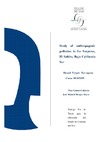Please use this identifier to cite or link to this item:
https://accedacris.ulpgc.es/jspui/handle/10553/56092
| DC Field | Value | Language |
|---|---|---|
| dc.contributor.advisor | Gómez Cabrera, María Milagrosa | es |
| dc.contributor.advisor | José Manuel Borges Souza | es |
| dc.contributor.author | Vergés Tarragona, Ricard | es |
| dc.date.accessioned | 2019-07-15T10:08:10Z | - |
| dc.date.available | 2019-07-15T10:08:10Z | - |
| dc.date.issued | 2019 | - |
| dc.identifier.uri | https://accedacris.ulpgc.es/handle/10553/56092 | - |
| dc.description.abstract | Any dumped artificial object, whether intentionally or not in the marine environment, is considered marine litter. While marine litter consists of all kinds of materials, plastics debris are their major component, negatively affecting aquatic life, leading to socioeconomic costs and representing waste of valuable resources (PlasticsEurope, 20172018). Plastic debris are amongst the major threats to marine ecosystem, next to industrial fishing and climate change. Many marine species are known to be harmed and/or killed by plastic debris, which could jeopardize their survival, especially since many are already endangered by other forms of anthropogenic activities (Derraik, 2002). The target of this study is to quantify the pollution (mainly anthropogenic and plastic) and its origin on the marine ecosystem of a stretch of La Sorpresa beach, located in El Saltito, Baja California. After sampling an area of approximately 1500 m2 searching for any object that can easily be seen by the human eye, main sources of pollution, their origin and their effects on the ecosystem were identified. Solid differences were found when comparing marine litter accumulated in the sandy, intertidal, and underwater ecosystems. Out of 80 sampling spots, only 19 of them there were marine debris free. 5 of them could not be analysed because of their location, and the other 56 of them had at least one object which did not belong there. Among all the pollutants found (N=401), classified in 25 types and 11 materials, 61% of them were plastics. Regarding what they were specifically, the most common were: 14% fishing lines, 10% plastic bags, 10% aluminium cans, 7% plastic wraps and 7% cigarette butts. Many other types of marine debris were found, but with much less frequency. Surprisingly and against all expectations, only 4 straws were found, representing 1% of all objects. It was observed that most of the pollution proceeds from tourism, and 50% of it was found in a sandy substrate (both above and below the surface). A solid relationship between the marine debris was observed between the underwater and the intertidal ecosystem, as proved by several Spearman’s correlation tests. Cochran’s Q test made according to the presence or absence in the different substrates demonstrates that there is a significant difference between the presence of marine litter existing in each substrate. | en_US |
| dc.language | eng | en_US |
| dc.subject | 330811 Control de la contaminación del agua | en_US |
| dc.subject.other | Contaminación del mar | es |
| dc.subject.other | Contaminación por plásticos | es |
| dc.title | Study of anthropogenic pollution in La Sorpresa, El Saltito, Baja California Sur | es |
| dc.type | info:eu-repo/semantics/bachelorThesis | en_US |
| dc.type | BachelorThesis | en_US |
| dc.contributor.departamento | Departamento de Biología | es |
| dc.contributor.facultad | Facultad de Ciencias del Mar | en_US |
| dc.investigacion | Ciencias | en_US |
| dc.type2 | Trabajo final de grado | en_US |
| dc.utils.revision | Sí | en_US |
| dc.identifier.matricula | TFT-51859 | es |
| dc.identifier.ulpgc | Sí | en_US |
| dc.contributor.buulpgc | BU-BAS | es |
| dc.contributor.titulacion | Grado en Ciencias del Mar | es |
| item.fulltext | Con texto completo | - |
| item.grantfulltext | open | - |
| crisitem.advisor.dept | GIR ECOAQUA: Ecofisiología de Organismos Marinos | - |
| crisitem.advisor.dept | IU de Investigación en Acuicultura Sostenible y Ecosistemas Marinos (IU-Ecoaqua) | - |
| crisitem.advisor.dept | Departamento de Biología | - |
| Appears in Collections: | Trabajo final de grado | |
Page view(s)
60
checked on Jan 10, 2026
Download(s)
31
checked on Jan 10, 2026
Google ScholarTM
Check
Share
Export metadata
Items in accedaCRIS are protected by copyright, with all rights reserved, unless otherwise indicated.
